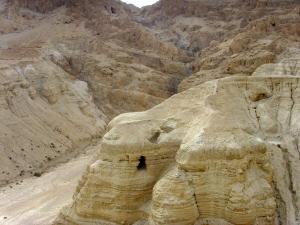Of the many ancient finds in Western Asia, none captured the imagination like the Dead Sea Scrolls.The timing and romance of the find itself, the scandals that almost immediately broke out, and the subsequent “secrecy” over the contents made the secular news.I’m convinced that a large part of the mystique has to do with the somewhat spooky name—Qumran scrolls never caught on, even though it is more accurate for many of the documents.Their discovery came after the Second World War when people were wanting good news, and, perhaps, an indication that all of this stuff was somehow predicted.Enter the scrolls.No doubt, these documents gave us quite a lot of information on the Second Temple Period—the time from the rebuilding of the Jerusalem temple in the sixth century BCE until its destruction under the Romans in the first century CE.Now the scrolls are back in the news.

A story by Nicola Davis in The Guardian announces that the origin of the scrolls is once again open to interpretation.The reason is somewhat technical—scrolls that were written on vellum (animal skins) had to be prepared for writing.One of the steps involved chemically treating the writing surface with a fine powder (the details are beyond me) so that it could be written upon.We’ve reached the point where the salts left behind can be tested for place of origin.The Guardian story notes that the Temple Scroll—one of the important non-biblical texts—was not prepared at Qumran (the site where most of the scrolls were found).That means that the scroll itself came from elsewhere, depending upon with whom you speak.The scrolls gather controversy like the Ugaritic tablets gather dust.
Part of the charm here is that there are many unanswered questions about these ancient texts.Who exactly wrote them is debated.Their find-spot suggests they were hidden away by the quasi-monastics who lived in nearby Qumran, but this doesn’t mean they necessarily wrote them.It’s still debated whether the Qumran community was made up of Essenes or not.One thing we do know about them is that they were able librarians.The scrolls themselves are symbolic of the strife in the region, having been discovered just as Israel was declared a nation.The scrolls were quickly politicized.They were kept under the auspices of a small group of academics and priests for many decades.And they still have a way of catching headlines.Even when its a matter of who powdered their faces.
